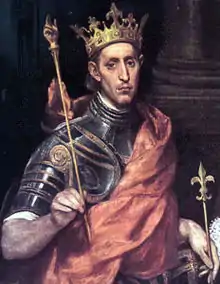1254
Year 1254 (MCCLIV) was a common year starting on Thursday (link will display the full calendar) of the Julian calendar.
| Millennium: | 2nd millennium |
|---|---|
| Centuries: | |
| Decades: | |
| Years: |
| 1254 by topic |
|---|
| Leaders |
|
| Birth and death categories |
| Births – Deaths |
| Establishments and disestablishments categories |
| Establishments – Disestablishments |
| Art and literature |
| 1254 in poetry |
| Gregorian calendar | 1254 MCCLIV |
| Ab urbe condita | 2007 |
| Armenian calendar | 703 ԹՎ ՉԳ |
| Assyrian calendar | 6004 |
| Balinese saka calendar | 1175–1176 |
| Bengali calendar | 661 |
| Berber calendar | 2204 |
| English Regnal year | 38 Hen. 3 – 39 Hen. 3 |
| Buddhist calendar | 1798 |
| Burmese calendar | 616 |
| Byzantine calendar | 6762–6763 |
| Chinese calendar | 癸丑年 (Water Ox) 3950 or 3890 — to — 甲寅年 (Wood Tiger) 3951 or 3891 |
| Coptic calendar | 970–971 |
| Discordian calendar | 2420 |
| Ethiopian calendar | 1246–1247 |
| Hebrew calendar | 5014–5015 |
| Hindu calendars | |
| - Vikram Samvat | 1310–1311 |
| - Shaka Samvat | 1175–1176 |
| - Kali Yuga | 4354–4355 |
| Holocene calendar | 11254 |
| Igbo calendar | 254–255 |
| Iranian calendar | 632–633 |
| Islamic calendar | 651–652 |
| Japanese calendar | Kenchō 6 (建長6年) |
| Javanese calendar | 1163–1164 |
| Julian calendar | 1254 MCCLIV |
| Korean calendar | 3587 |
| Minguo calendar | 658 before ROC 民前658年 |
| Nanakshahi calendar | −214 |
| Thai solar calendar | 1796–1797 |
| Tibetan calendar | 阴水牛年 (female Water-Ox) 1380 or 999 or 227 — to — 阳木虎年 (male Wood-Tiger) 1381 or 1000 or 228 |
| Wikimedia Commons has media related to 1254. |

Louis IX of France ends the unsuccessful Seventh Crusade.
Events
Asia
- King Louis IX of France, having exhausted his funds and being needed at home, abandons the Seventh Crusade (which he had conducted first in Egypt and then Syria), and returns to France.
- The classic Japanese text Kokin Chomonjo is completed.
- The Mongols destroy the Kingdom of Dali, in modern Yunnan.
- The Mongols enslave 200,000 Koreans, and take them away.
Northern Europe
- June 12 – The city of Alkmaar obtains city rights from the count of Holland, William II.[1]
- November 1 – Edward Plantagenet (the future Edward I of England, aged 15) marries Eleanor of Castile (aged c. 13), at the Abbey of Santa María la Real de Las Huelgas, Burgos. His father Henry III has demanded the marriage, in exchange for ending the war with her brother Alfonso X of Castile.
- In England, an important step in the evolution of the Parliament and Peerage occurs, as lesser barons are replaced, on the King's Council, by elected representatives from shires and cities.
- Pope Innocent IV excommunicates Conrad IV of Germany and Rudolph I of Germany (who is later elected Holy Roman Emperor).
- The Danish city of Copenhagen receives its city charter.
- The Swedish city of Malmö is founded.
- Danylo of Halych, prince of Halych-Wolyn Rus, is crowned a king. The kingdom of Rus (Ruthenia Minor, Halych-Wolyn) is founded.
Southern Europe
- December 2 – Manfred of Sicily defeats the army of Pope Innocent IV, at Foggia.
- King Louis IX of France expels all Jews from France.
- King Afonso III of Portugal holds the first session of the Cortes (Portugal's general assembly composed of nobles, members of the middle class, and representatives from all municipalities), in Leiria.
- The Ghibelline town of Pistoia is taken over by Guelph Florence.
- The Horses of Saint Mark, once supposed to have adorned the Arch of Trajan in ancient Rome, are installed at Saint Mark's Basilica in Venice.
- Battle of Adrianople: The Byzantines defeat Bulgaria.
Antarctica
- Mount Rittmann erupts.
Markets
Religion
- December 12 – Pope Alexander IV succeeds Pope Innocent IV, as the 181st pope.
- Construction is begun on the Cathedral of Saint Martin in Utrecht.
- The Catholic dogma of purgatory is clarified and so named, by the Catholic Church.
Births
- May 13 – Marie of Brabant, Queen of France (d. 1322)
- June 24 – Floris V, Count of Holland (d. 1296)
- September 15 – Marco Polo, Italian explorer (d. 1324)
- date unknown
- King Charles II of Naples, son of Charles of Anjou (d. 1309)
- Zhao Mengfu, Chinese scholar, painter and calligrapher (d. 1322)
- Ren Renfa, Chinese painter
- Beatrice of Castile, Marchioness of Montferrat (d. 1286)
Deaths
- March 28 – William de Ferrers, 5th Earl of Derby (b. 1193)
- May 21 – Conrad IV of Germany (b. 1228)[3]
- June 8 – Robert of Nantes, Latin Patriarch of Jerusalem
- November 3 – John III Doukas Vatatzes, Byzantine Emperor (b. 1193)
- December 7 – Pope Innocent IV
- date unknown
- Silvester de Everdon, English bishop
- Kristina Nilsdotter, Swedish noblewoman
References
- Vis, G.N.M. (1994). Oud en arm. Hervormde bejaardenzorg in Alkmaar, 1744-1994. Hilversum: Verloren. p. 16. ISBN 90-6550-502-4.
- Munro, John H. (2003). "The Medieval Origins of the Financial Revolution". The International History Review. 15 (3): 506–562.
- "Conrad IV | king of Germany". Encyclopedia Britannica. Retrieved February 14, 2020.
This article is issued from Wikipedia. The text is licensed under Creative Commons - Attribution - Sharealike. Additional terms may apply for the media files.
